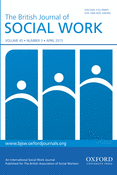-
Views
-
Cite
Cite
Marit Skivenes, Heidi Skramstad, The Emotional Dimension in Risk Assessment: A Cross-Country Study of the Perceptions of Child Welfare Workers in England, Norway and California (United States), The British Journal of Social Work, Volume 45, Issue 3, April 2015, Pages 809–824, https://doi.org/10.1093/bjsw/bct177
Close - Share Icon Share
Abstract
This paper examines a sample of ninety-three child welfare workers’ perceptions of emotional relations in risk assessment situations. Workers from England, Norway and California (USA) are interviewed about risk factors in a vignette. Seventy-three per cent of the total workers identify the emotional issues described in the vignette as a risk factor, but a lower percentage of the American workers do so. Nearly all of these workers identify the mother's lack of meeting her daughter's emotional needs as a risk factor; however, the analysis shows that only approximately one-third of these workers elaborate on the possible consequences and reasons for this lack of attachment. Even fewer suggest services that can improve the situation. The findings suggest that emotional issues have a relatively low importance in a risk assessment situation but that there are differences by country. Although the sample is small, it is likely that systemic factors in the child welfare system and the risk assessment approach explain some of these differences.




